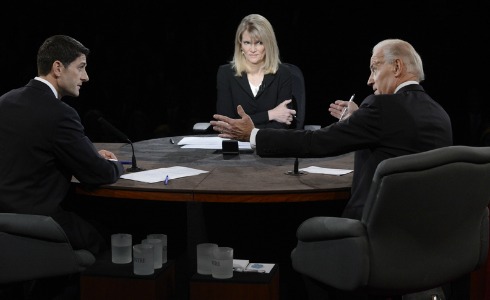
Raddatz, Biden, Ryan (Getty)
As Biden and Ryan spar, a moderator shines, and yet too many Americans are ignored.
Finally. After the disappointment that was Jim Lehrer’s performance as moderator during the first presidential debate of the 2012 election (which was widely panned) viewers, and voters, were graced with a debate moderator who was cool, calm, collected and in control. Martha Raddatz of ABC News had faced pre-debate criticism from conservative corners because President Obama was a peer of her ex-husband at the Harvard Law Review and subsequently attended the couple’s wedding decades ago. (Wouldn’t the fact that the president is friends with her ex-husband — as in former spouse — arguably work in the GOP’s favor in the present? But I digress.) For the most part, however, her performance at the vice presidential debate last night has been received widespread praise.
Also receiving high marks? Vice President Joe Biden, who in the eyes of many progressives did what President Barack Obama did not last week: forcefully question the honesty and accuracy of the Romney/Ryan ticket’s policy claims.
It appeared the vice president had actually been sent to a debate boot camp where he was coached in using as many synonyms for the words “liar” and “lying” and “lies” as possible. Some we heard tonight: “Not true,” “Not mathematically possible,” “This is a bunch of stuff,” and my new personal favorite “malarkey” an Irish expression, as Rep. Paul Ryan explained to those of us who aren’t of Irish origin. (Both vice presidential candidates are.)
At times Biden let his passion get the better of him. I question whether there were female viewers who were as uncomfortable as I was with his continued pointing at the moderator for emphasis. It’s rude to do with any gender, but somewhat menacing when a man does it to a woman.
But when it comes to the question of which of the two candidates won the debate it was no contest, particularly on foreign policy. There were moments when Rep. Ryan looked almost as in over his head as Sarah Palin did four years ago — only she’d never held Congressional office. He has.
As they sparred over foreign policy there was a clear knowledge and experience gap. For instance, when the vice president referred to Israeli Prime Minister Benjamin Netanyahu as “Bibi,” this demonstrated a level of comfort in that arena Ryan simply cannot match and his expression seemed to indicate that he knew it. When it came to domestic policy, however, at times the gap was much closer. Ryan is, after all, chairman of the House budget committee.
Anyway, Ryan didn’t blow it and since people don’t vote for vice presidents separately from presidents, not blowing it was really all Ryan had to do. It was the same four years ago: No one watching that debate left it believing Sarah Palin was ready for the presidency — even many Republicans didn’t believe that — but she wasn’t a total disaster, and that, frankly, was enough for that night.
I doubt few people listened to Ryan debate foreign policy and believed that he would be ready to assume the presidency should the need arise any time soon. But after the president’s performance last week, which wasn’t good, Ryan’s less-than-impressive foreign policy grasp is not likely at the forefront of voters’ minds. A possibly overwhelmed, overmatched and underwhelming president is.
To be clear, while there were two clear victors tonight — Raddatz and Biden — Ryan wasn’t really the biggest loser. People of color and the poor were.
Yes, the words “poor” and “poverty” were actually mentioned tonight—an improvement over the last debate. Interestingly, they were mentioned by Paul Ryan while the vice president referred to, “people like my parents” and similar phrases to denote the working class.) But, there was little substantive discussion of how to help those in poverty move up, or even survive, while the middle class received a number of mentions. Ryan gets credit for referencing the fact that “fifteen percent of Americans are in poverty” but what do we do to help them? Neither candidate addressed that satisfactorily.
It’s an omission that is especially relevant to communities of color, where poverty has a greater impact and the income disparity with whites is persistent. According to the National Poverty Center, in 2010 27.4 percent of blacks and 26.6 percent of Hispanics were poor, compared to 9.9 percent of non-Hispanic whites and 12.1 percent of Asians. While the Obama administration recently celebrated news that the unemployment rate has finally dipped below 8percent for the first time in four years, unemployment for black Americans remains at a staggering 13.4 percent. And yet if you were to listen to watch the first two debates these statistics might come as a shock to you, because people of color have been treated virtually invisible, even in the age of a black president.
I previously speculated about the questions I thought a black debate moderator might ask, something about which I can only speculate because there will not be one this election season. While I applaud Martha Raddatz’s performance for the most part, the vice presidential debate served as a powerful reminder that the diversity of moderators can affect the diversity of the policy topics discussed in a debate. For instance, in this debate there was a question specifically relating to women, when Raddatz asked about abortion, thus sparking a conversation about it and contraception.)
Here’s hoping people of color will not be losers for the third time in next week’s town hall-style debate between President Obama and Mitt Romney.
https://www.theroot.com/blogs/blogging-beltway/1-woman-wins-people-color-lose-vp-debate?page=0,1&wpisrc=root_lightbox